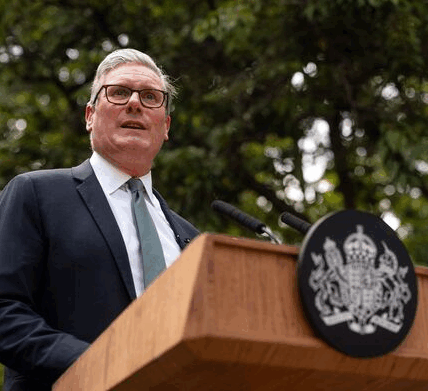Sir Keir has faced a turbulent first year in office, with his Government criticised for a string of policy reversals.

Prime Minister Sir Keir Starmer (Image: Getty)
Sir Keir Starmer has suffered a major political setback after a fresh analysis suggested his personal ratings are among the worst of any modern Prime Minister – prompting Reform UK leader Nigel Farage to claim there is “no way back” for him. Mr Farage’s remarks, made after Sir Keir announced a national grooming gang inquiry in an apparent U-turn, followed an update from Britain Elects, whose rolling tracker compares the popularity of serving Prime Ministers over their first 300 days in office.
Posting on X, the Reform UK leader declared: “It doesn’t matter how many U-turns Starmer does. He is unpopular because he is insincere. There is no way back for him.” The analysis found: “Compared to past Prime Ministers, Starmer’s start is a poor one. As of day 300, Starmer ranked the worst performing Prime Minister of the last nine (once you exclude, of course, Liz Truss).”
Sir Keir entered Downing Street on July 5, 2024, after securing a comfortable majority for Labour in the general election.
However, despite the scale of his victory, Britain Elects noted: “He began his premiership with just four-in-ten Britons holding a favourable view towards him, and a touch under that holding an unfavourable view.”
The tracker added: “On the net numbers he was in the green. But compared to David Cameron, the last Prime Minister to come in on an election win, these numbers pale poorly.”
The picture worsens when comparing Sir Keir’s trajectory with that of previous Prime Ministers. Britain Elects noted: “Whereas Starmer’s ratings plateaued around day 300, Gordon Brown’s plummeted.
“And Theresa May’s – whose own performance in the 2017 General Election campaign ruptured what goodwill the voters had for her – went from +16 to -16.”
The site also said: “For much of his leadership of the Labour Party, between 30 and 40% of us did not know what to think of Keir Starmer. Only after the Liz Truss mini-budget did opinion warm to the Leader of the Opposition. But relative to other LOTOs, his were still a muted series of ratings.”
It continued: “Approval ratings are important to measure that public goodwill. But in isolation they can be deceiving.
“Boris Johnson and David Cameron both went to the country in the net negative. But it didn’t matter, for their Labour counterparts were vastly more unpopular.”
Sir Keir has faced a turbulent first year in office. His Government has been criticised for a string of policy reversals – including on the two-child benefit cap, VAT on private schools, and the decision to delay housing reforms. At the same time, Labour has been hit by growing unease on the backbenches, particularly over its handling of Gaza and migration.
Industrial unrest has persisted in key sectors, while widespread winter flooding earlier this year put pressure on Downing Street’s response capabilities.
Meanwhile Chancellor Rachel Reeves‘s spending review last week has faced criticism for its potential to lead to significant tax increases and spending cuts.
Analysts warn that the government’s fiscal strategy may be unsustainable, with public spending at record highs and taxes also at elevated levels.
The Institute for Fiscal Studies cautioned that Reeves’s approach could result in “sharp trade-offs,” potentially undermining public trust in politicians

